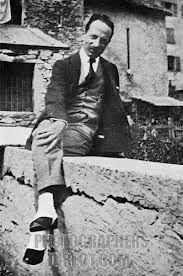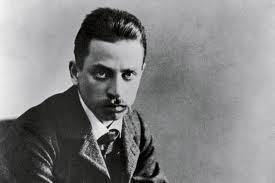A little while back, I reviewed the book by Pico Iyer in which he explored his obsession with Graham Greene, a man whose novels gave him uncanny insight into himself. Iyer wondered whether the strange power of writing came from an author’s ability to know us better than we know ourselves, and to provide an unexpected but illuminating pathway into the deeper reaches of our identity. With the work of some writers, he suggested, the process of reading is more than mere identification, it is a kind of homecoming.
I have four writers who occupy places in a kind of pantheon of literary wonders: Rilke, Kafka, Colette and Willa Cather. They are my Graham Greenes. Over the next few weeks I thought I would write about the relationship I have to them.

Rilke in an unusually jaunty and nonchalant mood.
Rilke is for me the gift that keeps on giving. As with all my special authors, I found it hard at first to even see, let alone articulate, what it was I found so hypnotic about him. It’s only in later life, as I’ve come not just to understand myself better, but to mature into the person I didn’t know I would become, that I can trace the outline of some reasons.
Whatever Rilke writes, there’s an urgency and a passion about it, an intensity that makes the words leap from the page. In his Letters to a Young Poet, Rilke writes:
A work of art is good if it has grown out of necessity. In this manner of its origin lies its true estimate: there is no other. Therefore, dear Sir, I could give you no advice but this: to go into yourself and explore the depths whence your life wells forth; at its source you will find the answer to the question whether you must create.’
I love this about Rilke; he manages to find a way to be given over entirely to literature without coming across as narcissistic, pretentious, hypocritical or overly idealising. Being dedicated to art is something of an anachronism in the 21st century, if not a shameful pose. What does it mean – if anything? – to look for a properly artistic path in a world where publishing is dominated by commercial concerns? What does an artist’s life look like today? Unlike Rilke, I don’t have aristocratic friends with castles on rocky promontories to go to when in search of inspiration. I have lunch boxes to prepare, and groceries to buy and, now I think of it, a load of washing waiting to be transferred to the tumble drier. How is it possible to create when daily, ordinary demands make a mockery of the vulnerabilities, the ideas, the painfully important things, in other words the very stuff of art that reality persists in covering up?
But Rilke always leads me back to the right path: it’s not about doing, but being.
Let your judgements have their own, quiet, undisturbed development, which must, like all progress, come from deep within, and cannot in any way be pressed or hurried. It means everything to carry for the full time and then to bring forth. […] To be an artist means: not to reckon and count; to ripen like the tree which does not force its sap and stands confident in the storms of Spring without fear lest no Summer might come after. It does come. But it comes only to the patient ones, who are there as if eternity lay in front of them, so unconcernedly still and far. I am learning it daily, learning it through pains to which I am grateful: patience is all!

The more usual, ‘brooding poet’ look.
This is a message I feel to be right: the need to wait for understanding to come, for what comes first is often convention, or personal prejudice, or some knee-jerk reaction. To write about what really matters, is to have patience to outlast the great tide of the superficial. But look, even as Rilke says something wise and wonderful, he reminds his readers that he does so from a firm position as wimp and failure. Rilke failed gloriously. He was often poorly and often blocked. He was disappointed and humiliated and forced to worry about finding a roof over his head, stuck with duties he didn’t want and demands he had neither time nor energy to accomplish. Oh Rilke’s life was often a mess, but he never shied from its messiness; rather he knew how to extract its virtue, by close observation and a sort of intrigued tenderness, even for the bad days. He made the most of everything.
I find this a particularly powerful stance given how porous Rilke was. A therapist once told me that porous people cannot be understood like others; they are beings from a different planet. I know Rilke was porous because of the way he wrote about his experiences. In The Notebooks of Malte Laurids Brigge, the narrator describes his first days and nights in Paris:
The electric street cars rage through my room with ringing fury. Automobiles race over me. A door slams. Somewhere a window-pane falls clattering. I can hear the big splinters laughing and the smaller ones sniggering.’
He goes for walks, but life still assaults him, even a woman merely sitting with her head in her hands:
The woman took fright and was torn too quickly out of herself, too violently, so that her face remained in her two hands. I could see it lying in them, its hollow form.’
The narrator finds himself on the inside of everything, unwillingly. Life is too penetrating, too loud, too determined to display its secrets. Even in writing about it, he can’t find sufficient distance to feel safe. The whole of the novel is about trying to find a form of narrative that will soothe his anxieties whilst uncovering the sorts of truths that will offer stability. Oh Rilke, how familiar that sounds!
This is what I find so mesmerising about Rilke; he is a writer who reveals himself with excoriating honesty by means of a narrative that rarely says anything specific about him. And if I had anything like a writing project, a goal or aim, then that would be it. Rilke is truthful because he has to be; anything else would cause him pain; but memoir isn’t his goal, he doesn’t have any sort of urge to glorify himself or to record his thoughts and feelings for vague posterity. John Donne’s description of the writing voice as: ‘my naked, thinking heart’ is perfectly Rilke. The essence of the man accompanies the reader every step of the way; Rilke is fully present in his writing in a manner that is deeply satisfying, because his closeness oddly enough gives the reader space to think. I can’t say why, but that paradox touches something vital for me.
This post is also for German Literature Month
